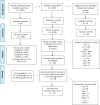Does education of primary care professionals promote patient self-management and improve outcomes in chronic disease? An updated systematic review
- PMID: 33712503
- PMCID: PMC8278509
- DOI: 10.3399/BJGPO.2020.0186
Does education of primary care professionals promote patient self-management and improve outcomes in chronic disease? An updated systematic review
Abstract
Background: Primary care has a vital role in supporting patient autonomy to enable people with long-term conditions to manage their own health and wellness. Evidence is needed on whether education and training of health professionals helps support patient self-management and improves outcomes. The authors' first systematic review included only two articles showing patient outcomes following health professional training for promoting patient self-management.
Aim: To present an updated review undertaken from September 2013 to August 2018.
Design & setting: A systematic review was undertaken using the PRISMA guidelines, following the methodology of the first review and is outlined in the PROSPERO registered protocol.
Method: Six databases were searched - Cochrane Library, PubMed, ERIC, Embase, Cumulative Index to Nursing and Allied Health Literature (CINAHL), and PsycINFO - in addition to web searches, hand searches, and bibliographies for articles published from 1 September 2013 to 31 August 2018.
Results: The updated systematic review showed more evidence is now available with 18 articles in the 5-year period from the 4284 abstracts located. Twelve of these articles showed a difference between intervention and control groups. Of the 18 articles identified, 11 were assessed as having a low risk of bias and five overall were rated of weak quality. The educational interventions with health professionals spanned a range of techniques and modalities, and many incorporated multiple interventions including patient components. There may be a lack of adoption owing to several challenges, including that complex interventions may not be delivered as planned and are difficult to assess, and owing to patient engagement and the need for ongoing follow-up.
Conclusion: More high-quality research is needed on what methods work best, for which patients, and for what clinical conditions in the primary care setting. The practical implications of training healthcare professionals require specific attention.
Keywords: chronic conditions; patient empowerment; patient participation; primary health care; self-management.
Copyright © 2021, The Authors.
Figures
Similar articles
-
Promoting and supporting self-management for adults living in the community with physical chronic illness: A systematic review of the effectiveness and meaningfulness of the patient-practitioner encounter.JBI Libr Syst Rev. 2009;7(13):492-582. doi: 10.11124/01938924-200907130-00001. JBI Libr Syst Rev. 2009. PMID: 27819974
-
Does patient self-management education of primary care professionals improve patient outcomes: a systematic review.BMC Fam Pract. 2018 Sep 29;19(1):163. doi: 10.1186/s12875-018-0847-x. BMC Fam Pract. 2018. PMID: 30268092 Free PMC article.
-
The effectiveness of internet-based e-learning on clinician behavior and patient outcomes: a systematic review protocol.JBI Database System Rev Implement Rep. 2015 Jan;13(1):52-64. doi: 10.11124/jbisrir-2015-1919. JBI Database System Rev Implement Rep. 2015. PMID: 26447007
-
Digital Education for the Management of Chronic Wounds in Health Care Professionals: Protocol for a Systematic Review by the Digital Health Education Collaboration.JMIR Res Protoc. 2019 Mar 25;8(3):e12488. doi: 10.2196/12488. JMIR Res Protoc. 2019. PMID: 30907743 Free PMC article.
-
Telephone interventions for symptom management in adults with cancer.Cochrane Database Syst Rev. 2020 Jun 2;6(6):CD007568. doi: 10.1002/14651858.CD007568.pub2. Cochrane Database Syst Rev. 2020. PMID: 32483832 Free PMC article.
Cited by
-
Time Capsule Medicine: A Mixed-Methods Pilot Study on Immersive Simulation for Chronic Disease Education in Medical Students.Clin Pract. 2025 Apr 9;15(4):78. doi: 10.3390/clinpract15040078. Clin Pract. 2025. PMID: 40310311 Free PMC article.
-
Physical and mental health of behavioural health certified peer specialists in four US states.BMJ Ment Health. 2025 Aug 3;28(1):e301788. doi: 10.1136/bmjment-2025-301788. BMJ Ment Health. 2025. PMID: 40754347 Free PMC article.
-
Impact of a Training Program on Oncology Nurses' Confidence in the Provision of Self-Management Support and 5As Behavioral Counseling Skills.Cancers (Basel). 2023 Mar 16;15(6):1811. doi: 10.3390/cancers15061811. Cancers (Basel). 2023. PMID: 36980697 Free PMC article.
-
'Their role has a lot of purpose beyond being just being about exercises': a qualitative study of patients' experiences of physiotherapy following a mild traumatic brain injury.BMJ Open Sport Exerc Med. 2024 Sep 30;10(3):e002027. doi: 10.1136/bmjsem-2024-002027. eCollection 2024. BMJ Open Sport Exerc Med. 2024. PMID: 39364219 Free PMC article.
-
Application of Interprofessional Education Model to University Pre-Licensure Health Students in the Management of Chronic Care Conditions in Zambia.Med J Zambia. 2022;49(2):185-197. doi: 10.55320/mjz.49.2.1118. Med J Zambia. 2022. PMID: 37378261 Free PMC article.
References
-
- World Health Organization Innovative care for chronic diseases: building blocks for action: global report. https://www.who.int/chp/knowledge/publications/icccglobalreport.pdf. [31 Mar 2021];2002
-
- WONCA Europe The European definition of general practice/family medicine. https://www.globalfamilydoctor.com/site/DefaultSite/filesystem/documents.... [31 Mar 2021];2011
LinkOut - more resources
Full Text Sources
Other Literature Sources

